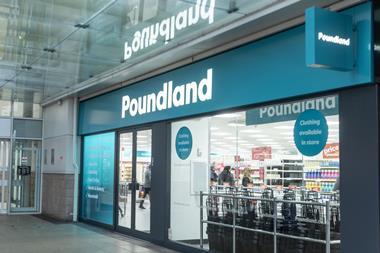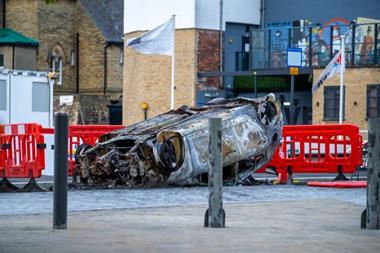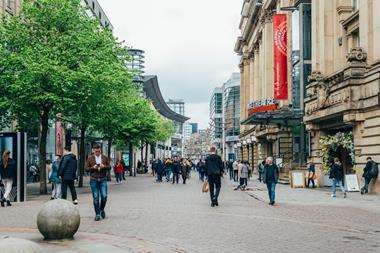Retailers have prioritised the needs of colleagues during the recent rioting and are working closely with the police and authorities to make use of the latest intelligence, says BRC chief executive Helen Dickinson
We’ve all been shocked by the riots that have unfolded across the UK. From Bristol to Belfast, we’ve seen horrific scenes of violence against people and property.
My heart goes out to those affected, from people targeted by rioters to the police who have put themselves in harm’s way, and shop staff clearing broken glass across their stores.
For retail, this is yet another challenge, and boy, there’ve been a few over the last decade. Brexit, Covid, a cost-of-living crisis… sometimes it feels like we fell out of the frying pan and have kept hopping from fire to fire ever since.
“Many ethnic minority colleagues feel increasingly anxious about the rising levels of prejudice taking hold in parts of the UK”
Through all this, the leaders I speak to talk about two priorities. The first is colleagues.
From the board room to the stock room, there are 3 million hardworking people who make British retail what it is. Making sure they are safe, appreciated and supported is paramount.
A close second is customers – ensuring that not only that their needs are met, but that their safety is considered.
We need to work together to handle these big issues as they come down the line. The recent riots are just another example. Earlier this week, almost 200 retail colleagues came together for a call organised by the BRC to discuss how they were handling this situation. We heard from a diverse range of voices, from the largest retailers to those representing small independent businesses on the high street.
The call allowed retailers to share their views on issues such as changing opening hours, communicating with colleagues and finding accurate information about where riots and protests would take place.
But at the heart of these discussions, the objective was the same – keep colleagues and customers safe. This was particularly important for the hundreds of thousands of ethnic minority colleagues, many of whom feel increasingly anxious about the rising levels of prejudice taking hold in parts of the UK.
The meeting was also attended by officials from the Home Office and Department for Business and Trade, as well as representatives from the police. By ensuring the voice of retailers is heard, the government is in the best position to understand and act upon the needs of our industry.
“Our 3 million retail colleagues are the lifeblood of our industry. We must all make sure we have their best interests in mind”
What should retailers do in response to riots and protests in the coming days? There is no one-size-fits-all approach.
Decisions to open or close, or shorten opening hours, will depend on proximity to events, the expected size of gatherings, the expected movement of rioters and protestors, and more. Retailers are working closely with local police forces where they can, to get the latest intelligence available.
Most retailers are empowering local teams to make the appropriate choice for colleagues and customers, providing them with the necessary support for changing hours, as well as protocols should a store need to evacuate or invacuate their staff. Retailers are also thinking beyond their operational hours – can colleagues arrive and get home safely? Are there safe locations for them to park?
Our 3 million retail colleagues are the lifeblood of our industry, without whom none of what we do would be possible. We must all make sure we have their best interests in mind.
I’m sure many of us – whether directly affected or not – are finding our stress levels on the rise during this difficult time. I would urge anyone who is finding it difficult to contact the Retail Trust, which provides free advice and support for everyone in our industry. I would urge managers, directors and chief executives to make sure their colleagues are made aware of this wonderful charity.
Ultimately, this latest turn of events is another example of why trade associations exist. We’re not just here to lobby government, though we do that. We’re not just here to analyse policy – and we do that too. We’re not even just there to provide operational support, market insight and be the voice of the industry (yup, yup, yup). We’re ultimately about creating the communities and networks that bring like-minded people and businesses together to tackle the challenges our industry faces. So that – to the benefit of all of us – we tackle them together.





























No comments yet